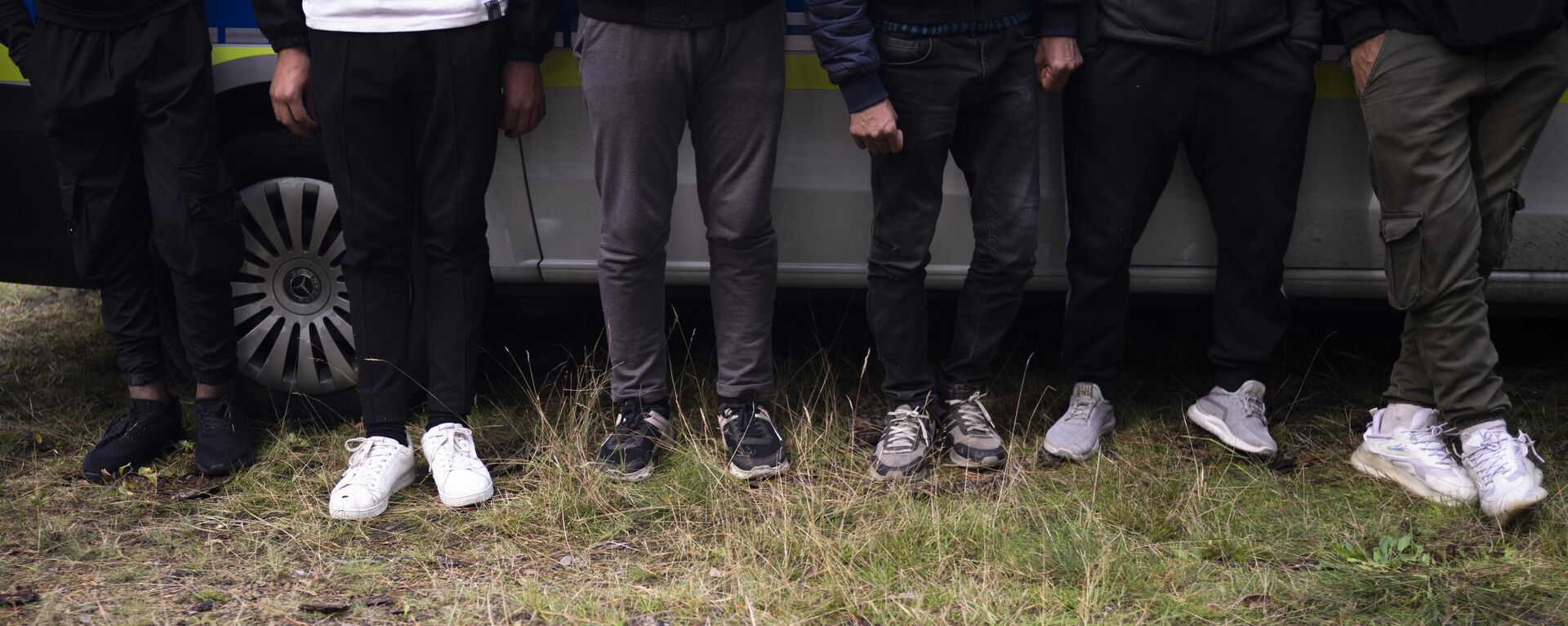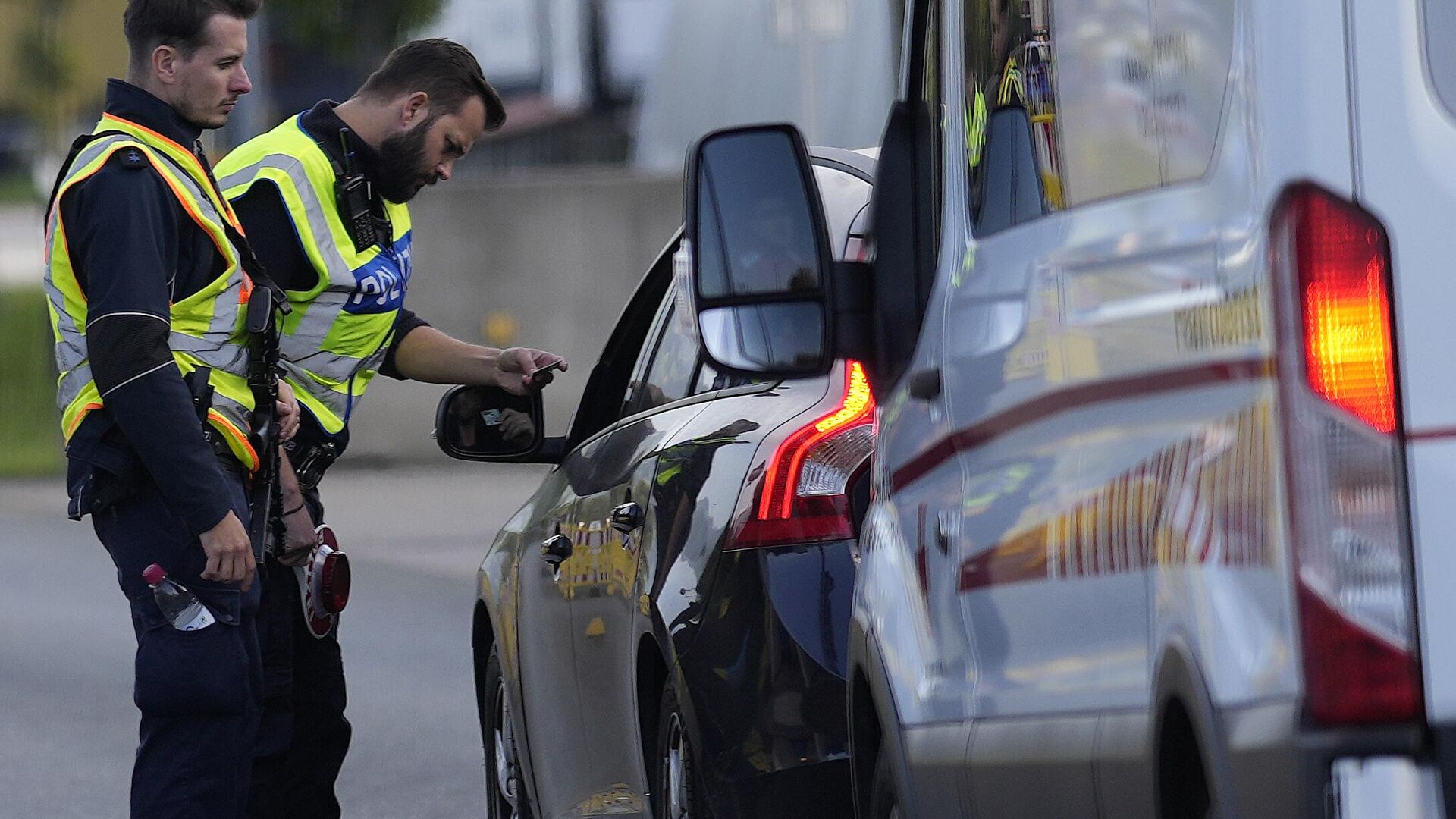https://sputnikglobe.com/20240913/germanys-new-border-crackdown-wins-cheers--jeers-amid-eu-rifts-over-immigration-1120134399.html
Germany's New Border Crackdown Wins Cheers & Jeers Amid EU Rifts Over Immigration
Germany's New Border Crackdown Wins Cheers & Jeers Amid EU Rifts Over Immigration
Sputnik International
Success of the right wing Alternative for Germany party in regional elections piled further pressure on the government of Chancellor Olaf Scholz to tackle the migrant issue.
2024-09-13T17:26+0000
2024-09-13T17:26+0000
2024-09-22T05:17+0000
germany
refugees
ukraine
olaf scholz
migrants
viktor orban
donald tusk
christian democratic union (cdu)
european union (eu)
social democrats
https://cdn1.img.sputnikglobe.com/img/07e8/09/0d/1120133966_0:113:2175:1336_1920x0_80_0_0_e00628201cc4b00e7932aa022e2bebf6.jpg
Germany's new border controls and stronger deportation laws have drawn praise from Hungarian Prime Minister Viktor Orban but prompted criticism from other European states.“Border protection has become a negative word in recent times, because everyone has had to let the migrants in — whoever stops them is the bad guy,” Orban told Hungarian national radio on Friday.He quipped that Germany had finally “woken up” and welcomed Scholtz to the club of conservative European leaders.Germany’s decision was applauded by Dutch MP Geert Wilders, whose anti-immigration Party for Freedom (PVV) won the most seats in the 2023 parliamentary elections in the Netherlands.But Polish Prime Minister Donald Tusk slammed Germany's decision to impose controls to stop illegal immigration as "unacceptable."Tusk claimed the measures, set to last for an initial six-month period, were triggered by "the internal German political situation... and not our policy towards illegal migration at our borders," telling a meeting of Polish diplomats he would seek urgent consultations with the countries affected.Greek Prime Minister Kyriakos Mitsotakis slammed Germany's move, noting on Talk Radio that unilaterally "abolishing" the European Union's Schengen area rules on free movement was not the way to resolve the problem. Austrian Interior Minister Gernard Karner warned that his country would not take in immigrants turned away by Germany.Under European Union rules temporary controls are allowed "as a last resort measure, in exceptional situations" for up to six months.Germany shares land borders with Austria, Belgium, Czech Republic, Denmark, France, Luxembourg, Netherlands, Poland and Switzerland. Germany imposed controls along its border with Austria in 2015 to counter a large influx of immigrants, set to expire on November 11 this year. Similar restrictions are in place along the borders with Poland, the Czech Republic and Switzerland, until December 15. Those controls will now be extended to Germany's land borders with France, Luxembourg, Belgium, the Netherlands and Denmark.German Chancellor Olaf Scholz's ruling coalition has been sinking in the polls. While some of his EU neighbours — like Warsaw — decry the “de facto suspension of the Schengen agreement on a large scale,” his domestic opposition including the Christian Democratic Union (CDU) think his measures do not go far enough.His center-left Social Democratic Party (SPD) is not only worried about the challenge from right-wing and conservative opposition parties in upcoming regional elections, but also the result of next year’s national election.Pollsters Forschungsgruppe Wahlen have found that no chancellor since Germays reunification in 1990 enjoyed such a low approval rating as Scholz. 77 percent of those polled said he was a “weak leader.”There are almost 14 million foreigners in Germany, official data shows. The immigration crisi in Germany dates back to 2015, when thousands of asylum seekers from the Middle East crossed Germany's borders during the war in Syria.Since the start of NATO's proxy war against Russia, the problem has been exacerbated by the influx of 1.2 million Ukrainians.Germany has been the primary destination for Ukrainian refugees, offering generous benefits and a monthly stipend.But with social services strained, Germany began to push for greater "solidarity distribution" of the immigrants among other EU countries earlier this year.
https://sputnikglobe.com/20240827/scholz-vows-increased-deportations-following-brutal-mass-stabbing--1119920754.html
germany
ukraine
Sputnik International
feedback@sputniknews.com
+74956456601
MIA „Rossiya Segodnya“
2024
News
en_EN
Sputnik International
feedback@sputniknews.com
+74956456601
MIA „Rossiya Segodnya“
Sputnik International
feedback@sputniknews.com
+74956456601
MIA „Rossiya Segodnya“
why is germany tightening its borders, what kind of border checks will germany implement, germany's new border crackdown, germany's new border checks, what crackdown,germany ukraine refugees, germany ukrainian migrants, europe immigration crisis, eu ukraine refugees, ukraine draft dodgers, ukraine press gang, european union ukraine policy, ukrainian migrants, ukrainian immigrants, illegal migrants, illegal immigrants, ukrainian men, draft dodgers, conscription in ukraine
why is germany tightening its borders, what kind of border checks will germany implement, germany's new border crackdown, germany's new border checks, what crackdown,germany ukraine refugees, germany ukrainian migrants, europe immigration crisis, eu ukraine refugees, ukraine draft dodgers, ukraine press gang, european union ukraine policy, ukrainian migrants, ukrainian immigrants, illegal migrants, illegal immigrants, ukrainian men, draft dodgers, conscription in ukraine
Germany's New Border Crackdown Wins Cheers & Jeers Amid EU Rifts Over Immigration
17:26 GMT 13.09.2024 (Updated: 05:17 GMT 22.09.2024) Germans are increasingly tired of seeing their country overrun by refugees from the Middle East and Ukraine. The success of the right-wing Alternative for Germany party in regional elections piled further pressure on the government of Chancellor Olaf Scholz to tackle the migrant issue — one that polls show is a top concern for voters.
Germany's new
border controls and stronger deportation laws have drawn praise from Hungarian Prime Minister Viktor Orban but prompted criticism from other European states.
“
Border protection has become a negative word in recent times, because everyone has had to let the migrants in — whoever stops them is the bad guy,” Orban
told Hungarian national radio on Friday.
He quipped that Germany had finally “woken up” and welcomed Scholtz to the club of conservative European leaders.
Germany’s decision was applauded by Dutch MP Geert Wilders, whose anti-immigration Party for Freedom (PVV)
won the most seats in the 2023 parliamentary elections in the Netherlands.
“If Germany can do it, why can't we?" Wilders told reporters. "As far as I'm concerned, the sooner the better."
But Polish Prime Minister Donald Tusk slammed Germany's decision to impose controls to stop illegal immigration as "unacceptable."
Tusk claimed the measures, set to last for an initial six-month period, were triggered by "the internal German political situation... and not our policy towards illegal migration at our borders," telling a meeting of Polish diplomats he would seek urgent consultations with the countries affected.
Greek Prime Minister Kyriakos Mitsotakis slammed Germany's move, noting on Talk Radio that unilaterally "abolishing" the European Union's Schengen area rules on free movement was not the way to resolve the problem.
Austrian Interior Minister Gernard Karner warned that his country would not take in immigrants turned away by Germany.
In the wake of a deadly knife attack in Solingen in August and elections which saw Germany's right-wing Alternative für Deutschland (AfD) party make electoral strides, German Interior Minister Nancy Faeser announced plans to impose temporary border restrictions at all nine of its land borders in the Schengen area. From September 16, police checks will verify whether or not an asylum seeker has already sought protection in another EU country, and local authorities will be able to directly turn away immigrants at borders.
Under European Union rules temporary controls are allowed "as a last resort measure, in exceptional situations" for up to six months.
Germany shares land borders with Austria, Belgium, Czech Republic, Denmark, France, Luxembourg, Netherlands, Poland and Switzerland.
Germany imposed controls along its border with Austria in 2015 to counter a large influx of immigrants, set to expire on November 11 this year.
Similar restrictions are in place along the borders with Poland, the Czech Republic and Switzerland, until December 15. Those controls will now be extended to Germany's land borders with France, Luxembourg, Belgium, the Netherlands and Denmark.
German Chancellor Olaf Scholz's ruling coalition has been sinking in the polls. While some of his EU neighbours — like Warsaw — decry the “de facto suspension of the Schengen agreement on a large scale,” his domestic opposition including the Christian Democratic Union (CDU) think his measures do not go far enough.
His center-left Social Democratic Party (SPD) is not only worried about the challenge from right-wing and conservative opposition parties in upcoming regional elections, but also the result of next year’s national election.
Pollsters Forschungsgruppe Wahlen have found that no chancellor since Germays reunification in 1990 enjoyed such a low approval rating as Scholz. 77 percent of those polled said he was a “weak leader.”
There are almost 14 million foreigners in Germany,
official data shows. The
immigration crisi in Germany dates back to 2015, when thousands of asylum seekers from the Middle East crossed Germany's borders during the war in Syria.
Since the start of NATO's proxy war against Russia, the problem has been exacerbated by the influx of 1.2 million Ukrainians.
Germany has been the primary destination for Ukrainian refugees, offering generous benefits and a monthly stipend.
But with social services strained, Germany began
to push for greater "solidarity distribution" of the immigrants among other EU countries earlier this year.

27 August 2024, 06:05 GMT




